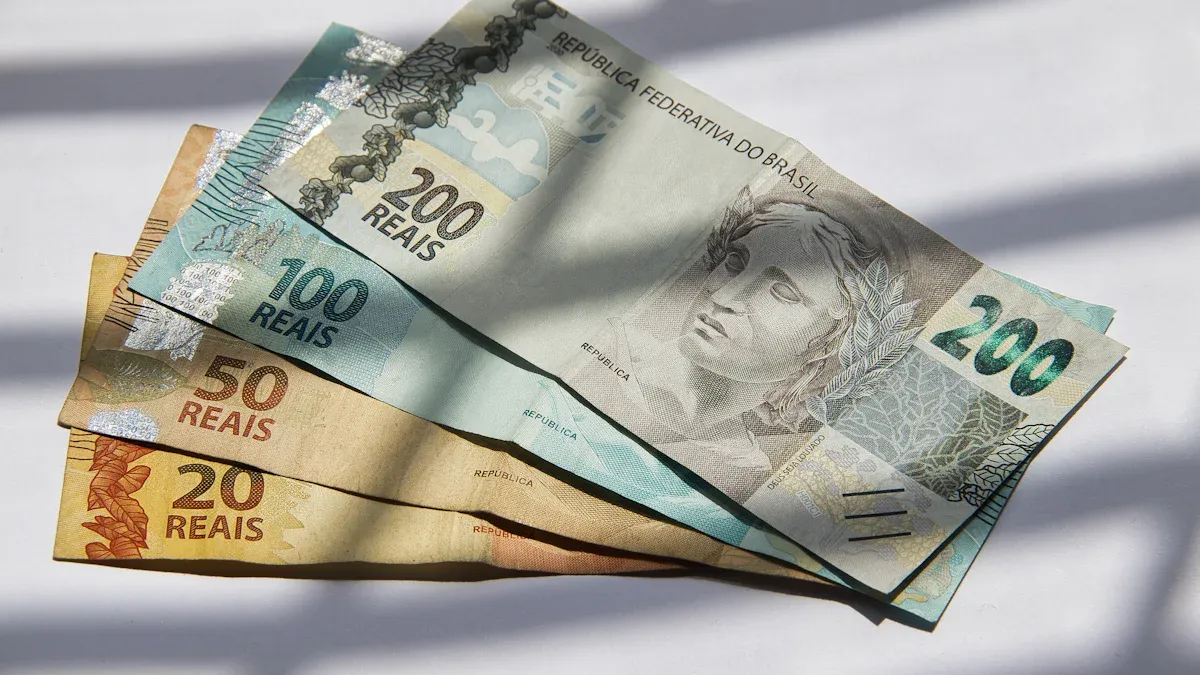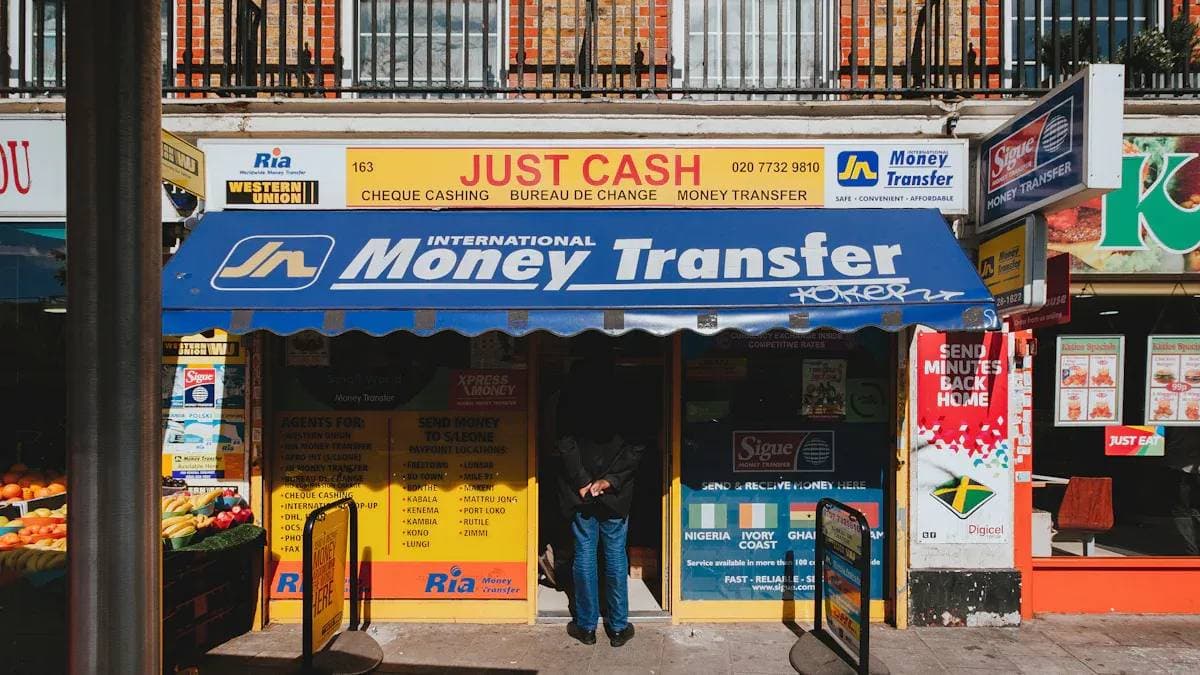- EasyCard
- Trade
- Help
- Announcement
- Academy
- SWIFT Code
- Iban Number
- Referral
- Customer Service
- Blog
- Creator
How to Send Money to Brazil: Documents, Rights & Costs

Image Source: pexels
To send money to brazil, you need to gather some key documents. You must provide your ID, the recipient’s CPF, and account details. Banks and online services may ask for a passport, proof of account balance, or forms confirming transfer information. See the table below for common requirements:
| Sending Method | Common Documents Required |
|---|---|
| Bank Transfer | Copy of passport or valid ID, evidence of account balance, form confirming details and transfer amount |
| Online Remittance | Personal contact information (name, email, phone), additional documents may be required depending on amount sent |
You must follow brazil’s financial rules for any money transfer to brazil. Using pix helps speed up the process and keeps costs low. Pix works with many banks in brazil, making it a popular choice for fast, secure transfers.
Key Takeaways
- Gather all required documents before sending money, including your ID, the recipient’s CPF, and accurate bank details to avoid delays.
- Choose a reliable provider that supports Pix for fast, low-cost transfers and verify your account to ensure secure transactions.
- Double-check recipient information carefully to prevent errors that can delay or block your transfer.
- Compare fees, exchange rates, and taxes from different providers to save money and understand the total cost of your transfer.
- Know your rights: track your transfer, keep confirmation numbers, and contact customer support quickly if problems arise.
Required Documents

Image Source: pexels
Sender Identification
When you send money to brazil, you must prove your identity. Most banks and online services in brazil require you to show a valid government-issued photo ID. You can use your passport or a national ID card. Some providers may also ask for your proof of address, such as a utility bill or bank statement. If you use an online platform, you often need to upload a clear photo of your ID and sometimes take a selfie for verification. This process helps prevent fraud and keeps your transfer secure.
Recipient Details
You must provide accurate recipient information to ensure your transfer reaches the right person in brazil. Banks and online money transfer services in brazil may ask for different details. The table below shows the most common fields you need to fill out:
| Recipient Information Field | Details Required |
|---|---|
| Full Name | Recipient’s full legal name |
| Local Account Number & Type | 4 to 12 digits, specify account type |
| Branch Code | 4 to 5 digits |
| Bank Name and Bank Code | Bank name and 3-digit bank code |
| Tax ID | CPF (11 digits) for individuals or CNPJ (14 digits) for businesses |
Some online services, such as Wise, let you send money to brazil using only the recipient’s email address or phone number if they have a verified account. This option can make the process faster and easier.
Tip: Always double-check the recipient’s CPF (Cadastro de Pessoas Físicas) or CNPJ (Cadastro Nacional da Pessoa Jurídica) before you confirm the transfer. Mistakes can delay your transfer or cause it to fail.
Large Transfer Requirements
If you plan to send a large amount of money to brazil, you must prepare extra documents. Transfers over $10,000 trigger stricter checks by banks and money transfer providers. You need to show proof of your identity and the source of your funds. For example, you may need to provide recent payslips, tax returns, or a sales agreement if you are buying property in brazil. Financial institutions must report transfers over $10,000 to authorities under laws such as the Bank Secrecy Act.
Common reasons for sending large amounts to brazil include supporting family members, transferring your own funds, or buying real estate. In these cases, you may need to show documents that prove your relationship to the recipient or the purpose of the payment. Banks in brazil, such as Banco Rendimento, may hold your funds until you submit all required paperwork. You must also follow IRS rules if you hold more than $10,000 in foreign accounts, including filing reports like FBAR and complying with FATCA regulations.
Note: Some providers set daily limits for transfers. If you need to send more than $3,000, check with your provider about their documentation policies. Even if brazil does not require extra documents for amounts over $3,000, your provider might.
How to Send Money to Brazil

Image Source: unsplash
Choose a Provider
You need to select a reliable service before you send money to brazil. Many options exist, including banks, Wise, Western Union, and online remittance service platforms like Remitly or Ria. Each provider offers different features, fees, and speeds. Some specialize in fast transfers, while others focus on low costs or wide coverage across brazil.
When you compare providers, check if they support pix. Pix is a popular payment system in brazil that allows instant transfers, often with lower fees. Many online remittance service companies now offer pix as a payout method. You should also confirm if the provider is an international remittance provider with a strong reputation for security and compliance.
Note: Zelle does not support international transfers. You cannot use Zelle to transfer money to brazil.
Set Up and Verify Account
After you choose your provider, you must create an account. Most online remittance service platforms require you to enter your full name, date of birth, email, and phone number. Some may ask for your nationality or occupation, especially if you live outside the United States or Canada. You will need to set up security questions and agree to the provider’s terms and conditions.
Verification is a key step. Providers ask for identification to prevent fraud and comply with regulations in brazil. You can use a passport, a driver’s license, or an identity card issued within the past 15 years. Provisional refugee IDs are not accepted. The provider will send a security code to your phone number. Enter this code to activate your account.
| Step | What You Need to Do |
|---|---|
| Create Account | Enter personal details (name, birth date, email, phone) |
| Set Security | Choose security questions, agree to terms |
| Verify Identity | Upload ID (passport, driver’s license, or identity card) |
| Activate Account | Enter security code sent to your phone |
Enter Recipient Information
You must provide accurate recipient details to ensure your remittance reaches the right person in brazil. Providers require the recipient’s full legal name, bank account number and type, branch number, CPF (tax ID), date of birth, and mobile phone number. If you use an online remittance service, enter these details carefully. The recipient’s name must match the bank account owner’s name exactly.
For in-person transfers, present your government-issued ID or phone number and give the recipient’s bank and account information to the agent. You can pay with cash or a US bank-issued debit card. After payment, you receive a tracking number to share with the recipient. Some services, such as Wise, allow you to send money to brazil using only the recipient’s email or phone number if they have a verified account. Pix payments also require the recipient’s pix key, which could be their CPF, email, phone number, or a random code.
Tip: Double-check all recipient information before you confirm the transfer. Errors in names or account numbers can delay your remittance or send funds to the wrong person.
Confirm and Track Transfer
After you enter all details, review the information and confirm the transaction. The provider will give you a confirmation number or a Federal Reference number. This number helps you track your remittance. If you use a wire transfer, you can request a wire trace or an MT103 document to follow the payment’s progress. Wise and other online remittance service platforms offer real-time tracking through their apps or websites.
You may face some common issues during confirmation and tracking. Delays can happen if you enter incorrect recipient details or if the provider needs more documents for compliance. Sometimes, you may not get timely updates, making it hard to know if your funds arrived. Always keep your confirmation number and receipts safe. If you notice any problems, contact customer support quickly and provide your transaction details.
Note: Monitoring your transfer status through the provider’s platform helps you detect issues early. Prompt action and accurate documentation make it easier to resolve disputes or delays.
Money Transfer to Brazil: Costs
Transfer Fees
When you send a remittance to brazil, you pay a fee for the service. Banks often charge higher fees for a money transfer to brazil, sometimes up to $40 per transaction. Online remittance providers like Wise or Remitly usually offer lower fees, often between $2 and $10. Some services add extra charges for faster delivery or special payout methods. Always check the fee structure before you confirm your remittance. You can save money by choosing a provider with transparent pricing.
Exchange Rates
Exchange rates play a big role in the total cost of your remittance. If the Brazilian real loses value, you need more foreign currency to get the same amount in brazil. This happens when outside factors, such as US Federal Reserve interest rate hikes, make the real weaker. A weaker real increases costs for companies in brazil and leads to higher inflation. The Central Bank of brazil may raise interest rates to control inflation, which increases financial fees and the cost of a money transfer to brazil. Always check the exchange rate before you send your remittance.
IOF Tax
Brazil charges an IOF tax on every international remittance. The IOF rate depends on the type of transfer. The table below shows the current and future rates:
| Transaction Type | IOF Rate Before May 23, 2025 | IOF Rate After May 23, 2025 |
|---|---|---|
| Transfers to Own Accounts | 1.1% | 3.5% |
| Transfers to Third Parties | 0.38% | 3.5% |
After May 23, 2025, the IOF tax for any money transfer to brazil will be 3.5%. This applies to both transfers to your own account and to someone else’s account. You should factor this tax into your total remittance cost.
Saving on Costs
You can lower the cost of your remittance to brazil by following these steps:
- Use money transfer companies instead of banks. They usually offer better rates and lower fees for a money transfer to brazil.
- Try mobile remittance apps. These apps often have low or no fees and give you instant transfers.
- Contact your provider to ask for discounts or fee waivers, especially if you send remittance often.
- Watch exchange rates and send your remittance when rates are good.
- Consider peer-to-peer platforms or foreign exchange brokers for large remittance amounts.
- Compare fees and rates from different providers before you choose how to send your remittance.
Tip: Always review the total cost, including fees, exchange rates, and taxes, before you send your remittance to brazil.
Your Rights
Legal Protections
When you send money to brazil, you have important legal protections. Financial institutions and money transfer providers must follow strict rules set by brazil’s Central Bank and international regulators. These rules protect you from fraud and unauthorized transactions. If you use a licensed provider, you can expect fair treatment and clear information about your transfer. You have the right to know all fees, exchange rates, and taxes before you send money to brazil. If you believe your rights have been violated, you can file a complaint with the provider or with brazil’s consumer protection agencies.
Tracking and Refunds
You can track your money transfer to brazil at every step. Most providers give you a tracking number or a reference code. Use this code to check the status of your transfer online or through the provider’s app. If your money does not arrive in brazil, you have the right to request a refund. Providers must investigate missing or delayed transfers and return your funds if they cannot complete the transaction. Always keep your receipts and confirmation numbers. These documents help you resolve any issues quickly.
Tip: If you notice a problem with your transfer to brazil, contact customer support right away. Quick action helps protect your money.
Data Security
Your personal and financial data stays protected when you send money to brazil. Reputable providers use encryption and secure servers to keep your information safe. They must follow brazil’s data protection laws, which limit how your data is used and shared. You have the right to ask how your data is stored and to request corrections if you find errors. Never share your passwords or security codes with anyone. Protecting your data helps prevent identity theft and fraud.
Payment Methods
Choosing the right payment method helps you send money to Brazil quickly and securely. Each method offers different benefits for speed, cost, and convenience. Below, you will find a comparison of the main options.
Bank Transfers
Bank transfers remain a common way to send remittance to Brazil. You can use your local bank or an international bank with a presence in Brazil. This method requires you to provide the recipient’s bank details and CPF. Bank transfers often take one to three business days to process. Fees can reach $40 per transaction, and exchange rates may not be favorable. Banking hours and intermediaries can cause delays. Many people prefer other options for faster service and lower costs.
Pix Payments
Pix payments have changed how you send money to Brazil. You can use Pix through banks, online remittance service platforms, or mobile apps. Pix payments process instantly, usually within seconds, and work 24/7, including weekends and holidays. Over 168 million users trust Pix for its speed and reliability. You pay little or no fees as an individual, and businesses enjoy much lower costs than with traditional bank transfers or credit cards. Pix payments help businesses improve cash flow and settle invoices right away. You only need the recipient’s Pix key, which could be a CPF, email, phone number, or random code. Pix payments have set records, handling over 227 million transactions in a single day. You avoid payment delays and keep your remittance secure.
Note: Pix payments offer real-time processing, making them much faster and more cost-effective than traditional bank transfers.
Online Services
Online remittance service providers give you flexibility and convenience. You can use platforms like Wise or Remitly to send money to Brazil from your phone or computer. These services often support Pix payments, letting you benefit from instant transfers and low fees. Online remittance service platforms show you the total cost upfront, including fees and exchange rates. You can track your remittance in real time. Many users choose online remittance service options for their transparency and ease of use.
Cash Pickup
Cash pickup lets your recipient collect money in person at a partner location in Brazil. You send the remittance through a provider, and the recipient shows ID to receive cash. This method works well if your recipient does not have a bank account or prefers cash. Processing times vary, but some services offer same-day pickup. Fees may be higher than with Pix payments or online remittance service options. Always check the provider’s network and hours before choosing this method.
| Payment Method | Speed | Cost | Availability | Best For |
|---|---|---|---|---|
| Bank Transfer | 1-3 days | High | Banking hours | Large amounts, bank users |
| Pix Payments | Seconds | Low/Free | 24/7, all year | Fast, low-cost transfers |
| Online Remittance | Minutes-Hours | Low | 24/7 (most services) | Convenience, tracking |
| Cash Pickup | Same day | Medium-High | Business hours | No bank account, cash needs |
Tip: For most people, Pix payments provide the fastest and most affordable way to send money to Brazil. Many online remittance service platforms now support Pix, making your transfer even easier.
You have many safe and cost-effective ways to move funds to Brazil.
- Pix, managed by the Central Bank of Brazil, offers instant, secure transfers with no fees for peer-to-peer payments.
- Digital wallets like PicPay and Mercado Pago give you more flexibility and security.
- Digital remittance platforms now provide fast, low-cost transfers.
- Always check fees and exchange rates.
- Confirm recipient details and preferred delivery method.
- Review local regulations and refund policies.
Choosing the right provider and preparing the correct documents helps you protect your money and avoid delays.
FAQ
What is the fastest way to send money to Brazil?
You can use Pix payments for instant transfers. Most transactions complete within seconds. Many online remittance platforms support Pix, giving you speed and security. Always check if your provider offers Pix before starting your transfer.
Which documents do I need to send money to Brazil?
You need a valid photo ID, your recipient’s CPF, and their bank account details. Some providers may ask for proof of address or the purpose of your transfer. Always prepare these documents before you begin.
Are there limits on how much money I can send to Brazil?
Yes, providers set daily and monthly limits. The table below shows typical limits:
| Provider | Daily Limit (USD) | Monthly Limit (USD) |
|---|---|---|
| Wise | $10,000 | $30,000 |
| Remitly | $2,999 | $10,000 |
Check your provider’s policy before sending large amounts.
Can I get a refund if my transfer fails?
Yes. If your transfer does not reach the recipient, you can request a refund. Contact your provider’s customer support with your transaction details. Keep your confirmation number and receipts to help resolve issues quickly.
Sending money to Brazil often comes with strict document checks, IOF taxes, and high bank fees that can eat into what your recipient actually gets. With BiyaPay, you gain a simpler, faster, and more transparent alternative. Enjoy remittance fees as low as 0.5%, real-time FX rate checks and instant conversions, and seamless transfers in both fiat and digital currencies. Best of all, BiyaPay provides same-day transfers with same-day arrival, so your funds reach Brazil quickly, securely, and without hidden costs. Registration takes minutes, and you’ll always see the exact amount your recipient will receive before confirming. Discover a better way to send money to Brazil with BiyaPay.
Cut through the paperwork and high fees—start today with BiyaPay.
*This article is provided for general information purposes and does not constitute legal, tax or other professional advice from BiyaPay or its subsidiaries and its affiliates, and it is not intended as a substitute for obtaining advice from a financial advisor or any other professional.
We make no representations, warranties or warranties, express or implied, as to the accuracy, completeness or timeliness of the contents of this publication.




Contact Us
Company and Team
BiyaPay Products
Customer Services
is a broker-dealer registered with the U.S. Securities and Exchange Commission (SEC) (No.: 802-127417), member of the Financial Industry Regulatory Authority (FINRA) (CRD: 325027), member of the Securities Investor Protection Corporation (SIPC), and regulated by FINRA and SEC.
registered with the US Financial Crimes Enforcement Network (FinCEN), as a Money Services Business (MSB), registration number: 31000218637349, and regulated by FinCEN.
registered as Financial Service Provider (FSP number: FSP1007221) in New Zealand, and is a member of the Financial Dispute Resolution Scheme, a New Zealand independent dispute resolution service provider.




















